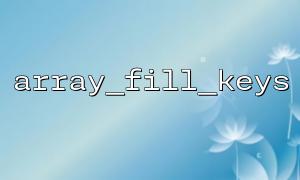In PHP, the array_fill_keys function is used to fill an array with a given value, using specified keys. This is a very useful function, especially when initializing an array and wanting to populate it with specific keys. However, in some edge cases, passing an empty key can cause errors or unexpected results. So, how can we avoid this? In this article, we will explore the issues with array_fill_keys when the keys are empty and provide solutions.
The array_fill_keys function accepts two parameters:
keys: An array containing the keys.
value: The value used to fill the array.
$array = array_fill_keys(['a', 'b', 'c'], 1);
print_r($array);
Output:
Array
(
[a] => 1
[b] => 1
[c] => 1
)
In this example, array_fill_keys fills the array ['a', 'b', 'c'] with the value 1 for each key. The function works by creating a new array with the given keys, each corresponding to the same value.
If we pass an array of keys containing empty values, the array_fill_keys function will return an array that does not include that key. Specifically, if the array contains an empty string or null as a key, PHP will automatically skip over these keys, which can lead to unexpected results. Here’s an example:
$array = array_fill_keys(['a', '', 'c'], 1);
print_r($array);
Output:
Array
(
[a] => 1
[c] => 1
)
You will notice that the empty string '' is ignored. While no error is thrown directly, this is unexpected behavior, especially when the keys array does indeed contain empty values.
In real-world development, we need to check for empty keys and handle them appropriately before calling array_fill_keys. Below are a few common solutions:
Before calling array_fill_keys, you can filter out empty keys using the array_filter function. array_filter removes any elements in the array that are null, empty strings, or false.
$keys = ['a', '', 'c'];
$filtered_keys = array_filter($keys, function($key) {
return !empty($key);
});
$array = array_fill_keys($filtered_keys, 1);
print_r($array);
Output:
Array
(
[a] => 1
[c] => 1
)
By doing this, we ensure that there are no empty keys in the array passed to array_fill_keys, preventing unnecessary empty values from appearing.
If you want to generate a corresponding key even when the key is empty, you can replace empty values with a default key before filtering. For example, we can replace an empty string '' with 'default_key':
$keys = ['a', '', 'c'];
$keys = array_map(function($key) {
return $key === '' ? 'default_key' : $key;
}, $keys);
$array = array_fill_keys($keys, 1);
print_r($array);
Output:
Array
(
[a] => 1
[default_key] => 1
[c] => 1
)
In this case, even if there is an empty key in the original array, it will be replaced by the specified default key, avoiding data loss.
If empty keys are legitimate and you still want them to appear in the final result in some way, you can use array_merge to merge the data with empty keys. For example:
$keys = ['a', '', 'c'];
$values = array_fill_keys($keys, 1);
$values = array_merge([], $values); // Merge into a new array
print_r($values);
With this approach, you can ensure that the array structure is still processed, even when empty keys are involved.
array_fill_keys is a very useful PHP function, but in practice, we must pay special attention to whether the keys we pass in are empty. Empty keys can lead to missing expected keys in the generated array, affecting the program's logic. Therefore, it's important to properly check or preprocess the keys before calling array_fill_keys.
By filtering out empty keys, replacing empty keys, or using other methods, we can effectively avoid potential issues caused by empty keys and maintain the robustness of our code.





